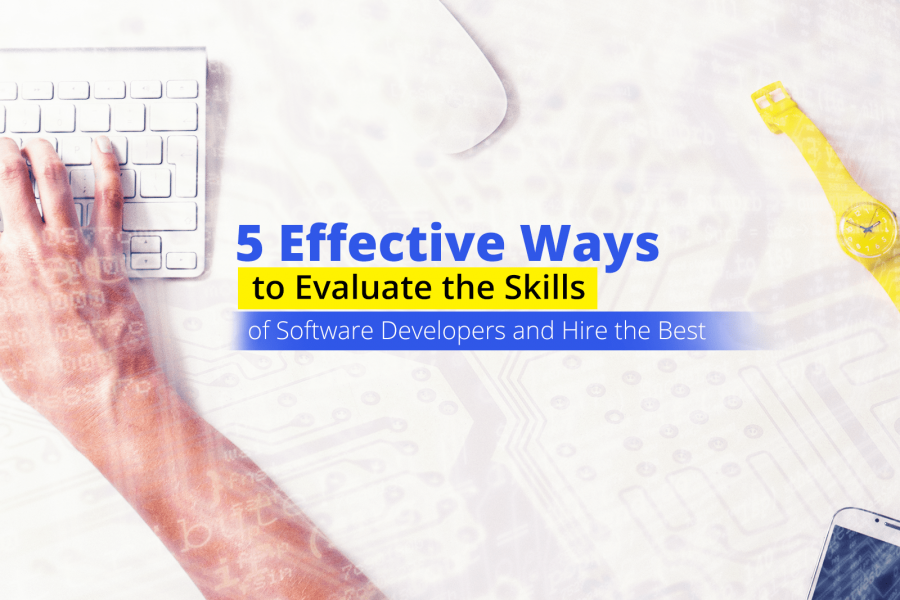
Very often when we discuss with our customers the hiring challenges of the tech industry, we talk about talent shortage and competition with other companies. However, according to the 2018 Developer Skills Report, done by HackerRank, a lot of tech businesses struggle with a different aspect of recruiting - skills evaluation.
According to 7,000+ employers surveyed, resumes still remain the most common way to assess developers. More than 60% of hiring managers reported that evaluating skills was their number one challenge - as opposed to the lack of talent.
While screening the resume can certainly help to weed out a bunch of weirdos with random skills, it can also be a barrier for HR to find the proven skill not screenable from a CV. So, what can give you a better outcome during your IT staffing process? Here are a few suggestions from our recruiting team.
1. Present the Candidate with a Programming Challenge That Focuses on a Solution, not the Language.
One of the best methods to find the right candidates for your new project is to test their overall problem-solving skills and ability to think logically. For this, don’t focus on the language: ask the developers to code a solution to a certain problem in any language of their choosing. Check how they address the challenges and find errors, review their coding style and logic.
A great developer will always present you with the most efficient or creative solution to the challenge dependent on what you are looking for. When they are not restricted by the language, candidates can also better demonstrate their overall skills that might be a great advantage for your team.
2. Ask for Referrals from Your Network and Tech Associations.
If you or your company is a member of any tech associations, such as BC Tech or the Board of Trade of Vancouver, ask the board members to recommend someone they know. Very often they can refer you to some highly qualified candidates who attend local networking events or who are considered leaders in the industry.
3. Check the Candidate’s Portfolio.
Our experience shows that the most responsible and skilled developers have a creative portfolio of their previous or current work. You can ask candidates to provide a link to their personal site or a list of open source projects. If they are contributors to GitHub and SourceForge, request them to indicate which parts of the projects they were responsible for. Check out the blog articles on their site: not everyone can be a great writer and coder at the same time, but sometimes you might find that rare ‘jewel’ you are looking for just by screening their posts.
Once you have looked at the portfolio, you will be better prepared to ask specific questions about a project, patterns and styles employed, and decisions involved in the development. This review can give you a deeper insight into both skills and personality than a simple coding test can provide.
4. Ask Your Trusted Tech Recruiting Advisor to Help.
Working with a tech recruiting advisor can save you a lot of time and resources. A dedicated IT consultant can find you an experienced software developer with rare skills in just a few days or even hours, while you may spend weeks hunting for the top tech personnel.
The same trusted advisor can help you with pre-screening and tech testing, background checks and portfolio evaluation, in addition to legal and immigration questions for the hard-to-find talent. A good tech recruiter can also assist you in relocating a highly experienced technical resource with unique skills for your project from overseas.
In fact, IT consulting is not as expensive as many think: some agencies offer flexible Pay As You Play models to help you avoid unnecessary expenses, not binding you with any long-term contracts.
5. Arrange Technical Tests in Person, not Online.
To better evaluate developers many hiring managers use coding challenges, personality tests, and written assignments for skill assessment. The best practice here is to arrange these evaluations in person. In 90% of cases, this proves to be more reliable and effective than tests administered solely online.
In-person evaluation reduces the potential for dishonesty and helps you check how the developer handles pressure. If you already have a team of developers, ask the brightest of them to create an evaluation challenge for the candidate and even to moderate the assessment. Very often those developers are going to work in the same team, so they can tell you whether it’s a good fit both technically and personally right away. Or, at least, they will point out the challenges you might face with the potential hire.
In the same 2018 Developer Skills Report, only 55% of developers out of almost 40,000 surveyed said resumes were a good reflection of their abilities. We hope that some of the strategies above will help you improve your assessment and easily find the right candidates for your team.








